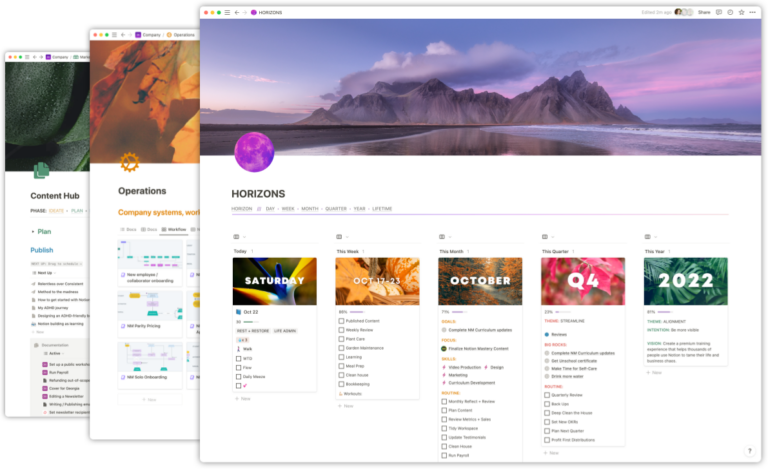If you’ve ever found yourself searching for the secret to productivity, you are far from alone.
There is no shortage of books, blogs, videos, podcasts, and courses offering advice on how to be more productive. It seems like every day there is a new app to help people get things done.
And, at Notion Mastery, it’s something we think about a lot. A LOT.
This is not simply because Notion is a productivity tool. It’s because productivity matters to humans—on multiple levels.
- Accomplishing things. At the core, productivity is about achieving outcomes and moving forward.
- Self-efficacy. When you complete something, you feel capable, competent, and believe in yourself.
- Meaning. Setting goals and taking action give us a sense of purpose.
In other words, when productivity suffers, it’s not just that we don’t accomplish things, our self esteem and sense of purpose are negatively impacted too. This is not trivial.
So not only do we feel behind, meaningless, and doubting our capabilities, but the list of things we still ‘have to do’ isn’t going anywhere.
It’s a lot.
Which is why most of us keep searching for ‘the solution’. Watching the next YouTube video, reading the next book, downloading the new app. Reading this blog post 😉
By now you already know there is no one-size-fits-all solution. But that’s not helpful advice when you are trying to keep your head above water.
If you are struggling to stay on top of things and tasks are falling through the cracks, there are steps you can take to move forward while also avoiding some common mistakes.
Common Mistakes
Ever spend a couple of days learning a new app and transferring all your projects and tasks only to soon find you are no better off?
It’s important to avoid these mistakes:
- Assuming a new app will fix things
It’s shiny, it’s new, and based on the description, it will solve all your problems. But an app alone won’t solve your problems. You need a system.
- Confusing a tool with a system
A productivity system is a repeatable, reliable set of processes. Tools help you implement your system.
- Choosing the tools before establishing a system
Your tools should support your system, not the other way around. When you commit to a tool first, you might close yourself off to practical processes that work well for you but not the tool.
Ultimately, your productivity relies on the strength of your system. Focusing on building a solid foundation is a priority.
A Complete System
The good news is that a system doesn’t have to be complicated. But it does need to be complete.
Your system should include:
Capture
An accessible and reliable way to collect tasks, ideas, notes, and resources.
Plan
After capturing into your system, you need to process, categorize, and prioritize.
Implementation Intention
Now that you know what work will happen and in what order, you need to decide when the work will happen. The more specific, the better.
Workflow
When it’s time to do the work, how will the work get done? What tools are required to complete your work? What steps will you follow and in what order?
Task Management
As work is completed, tracking tasks gives you a realistic view of your project progress and clear next steps.
Review
A regular review ensures you assess your progress compared to your plan so you can adjust as needed. It also serves as an opportunity to start the capture process over again.
Assessing Your System
If you want a system you can trust, you need to be honest about your current state.
What is my system’s weakest link?
When you look at the six elements of a complete system (capture, plan, implementation intention, workflow, task management, review), where are you weakest? Is one or more elements missing?
Can you describe your system to someone else?
If you are unable to explain your system to another person, it’s a sign your system needs work. If you can’t describe it at all, it’s likely you are still unclear on your system. If you describe it in a way no one understands, it’s likely your system is overcomplicated.
Could you replicate your system with different tools?
This doesn’t mean you should try different tools. It’s a question to assesses whether you really understand that a system is tool-agnostic. If all your current tools disappeared tomorrow, could you apply your same system to another set of tools?
Are you using the right tools?
If you have a complete system, are any of your tools getting in your way?
- is your capture tool easily accessible when you want to add new things?
- can you find your project plans in one place?
- can you easily block time in your calendar for project work?
- are you wasting time bouncing around software and apps to get your work done?
- is it easy to track your tasks?
- where do you review your progress?
Don’t Overcomplicate It
It’s common to assume a simple system is somehow lacking or unsophisticated, when in reality, a simple system may be exactly what you need.
No bells and whistles.
No fancy tricks.
Just a set of reliable, repeatable steps so you stay on top of work that matters.
This is why we believe in the idea of a Minimum Viable System: the simplest, complete system that is sufficient for your current needs.
Instead of spending hours learning a new tool that leads to another dead end, focus your energy on identifying a minimum viable system you can trust.

 Notion tips in your inbox
Notion tips in your inbox